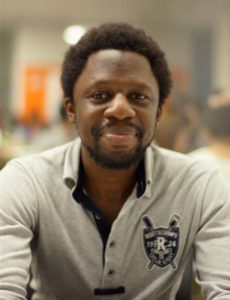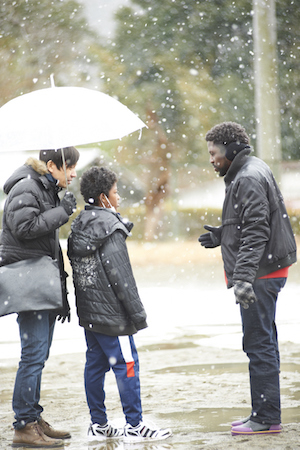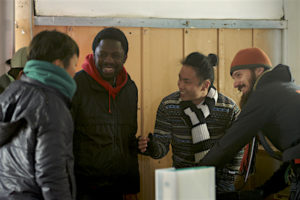2016 AIFF interviews with the filmmakers
 While living in Tokyo, Keisuke Fujii, a nine-year-old half Japanese half Ghanaian boy didn’t have to consider the color of his skin. When he and his mother moved to rural Japan his life drastically changed. The color of his skin was of contention with his classmates who assumed that he had AIDS because he is of African descent. In this short dramatic film, Born With It, a boy must find his footing and garner the strength to confront prejudice and bullying while becoming at peace with his identity.
While living in Tokyo, Keisuke Fujii, a nine-year-old half Japanese half Ghanaian boy didn’t have to consider the color of his skin. When he and his mother moved to rural Japan his life drastically changed. The color of his skin was of contention with his classmates who assumed that he had AIDS because he is of African descent. In this short dramatic film, Born With It, a boy must find his footing and garner the strength to confront prejudice and bullying while becoming at peace with his identity.
Writer-director Emmanuel Osei-Kuffour, Jr. is of Ghanaian decent, born and raised in Houston, Texas. As an adult, he lived in Japan working as a TV and film director and producer. His work has premiered at Cannes, Toronto, Palm Springs, and more. Osei-Kuffour has a BA from Stanford University and an MFA from New York University’s Tisch School of the Arts Asia in Singapore. He is currently living in Los Angeles.
On November 6, at 7:30pm, the 19 Annual Arpa International Film Festival will screen Born With It just before the start of the Awards Ceremony. As a part of a series of interviews with category nominees, Osei-Kuffour answered the following questions.
Why did you choose to make your film?
I lived in Japan for a total of about 7 years. So for me the film was a personal expression of my own struggle to be accepted by Japanese people. I chose to make it about a mixed race Japanese boy after hearing from a number of mixed race friends that they had a similar experience to the one I was writing about.
Name a moment during shooting that made you proud.
I’d say that the moment that made me proudest was actually finishing the first day. On the morning of first day there was a blizzard at the shooting location. And to add to the difficulty, we only had the actress that played the mother for one day. On the way to the first location, one of our production vans ran into a tree, due to the snow. So we ended up starting our shoot 5 hours late. To be honest I almost gave up after this accident, but since so many people donated to our crowdfunding campaign, I felt I owed them a great film. I fell back on the emotional subtext of each scene to redo the shot list and used this subtext to brainstorm solutions with each department on my set (so that we could finish the shoots). We ended up making the day and I personally think it was the best day of the shoot — both crew and cast were in their element in every scene.
Was there an “Aha moment” while making your film?
I didn’t have an Aha moment per say. But I did learn how to direct kids better. I’m so accustomed to using directing methods on older trained actors, but I found that ad-libs and improvisation worked much better with children.
Was there a bizarre moment that happened while making your film?
Nothing particularly bizarre occurred on set.
What is your favorite scene?
Prior to the shoot, I worried that actors playing Keisuke and the Mother wouldn’t have a realistic mother-son relationship on screen. Yet, my favorite scene in the film was the moment in the hospital where Keisuke’s Mother tells Keisuke about his father’s struggle with discrimination in Japan. It was one of the last scenes that we shot on the first day, and the performances felt most natural to me in this moment.
What is your favorite line?
Most definitely the line “I refuse to let people destroy me with their judgment.” This was in reference to the Mother recalling what Keisuke’s father used to say when he got looked at as if he was a monster in Japan.
 What does it mean to have your film selected as a category nominee by the Arpa International Film Festival?
What does it mean to have your film selected as a category nominee by the Arpa International Film Festival?
I’m really honored to have been selected as a nominee by this festival. I had a really great crew and actors that gave their all to make sure this delicate story was told in an authentic way. So this type of recognition reminds all of us that we succeeded in our efforts. And I hope that being able to screen this film to an international audience in LA will help give confidence to those suffering with identity issues and awareness to those that judge others who are different.
Born With It (2015) | 17 min. | Dramatic Short | Japan
Be sure to check out the trailer and get tickets to the Closing Night Awards Ceremony
 Written by Sharon Swainson
Written by Sharon Swainson
Communications & Development Director
2016 Arpa International Film Festival
